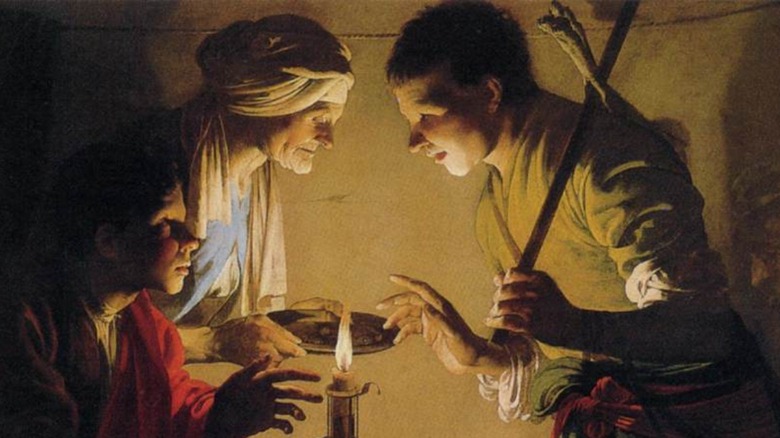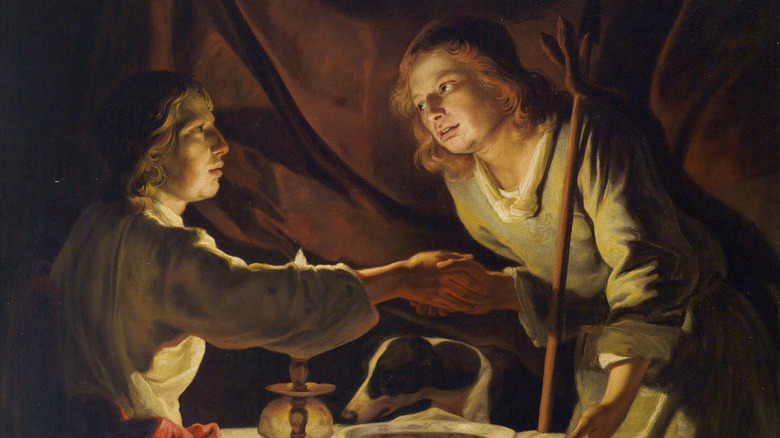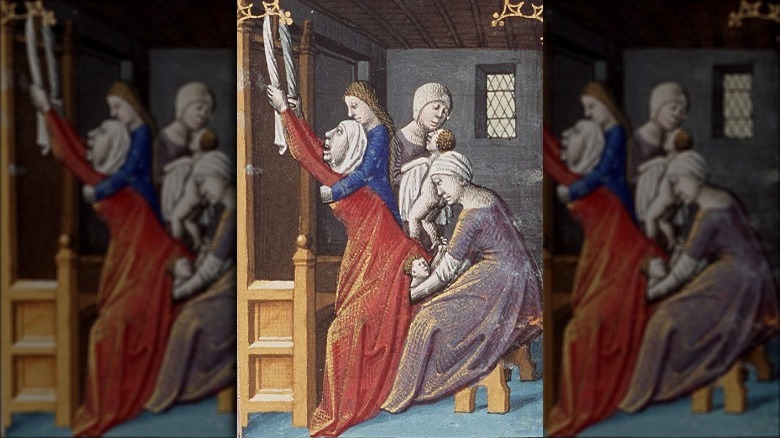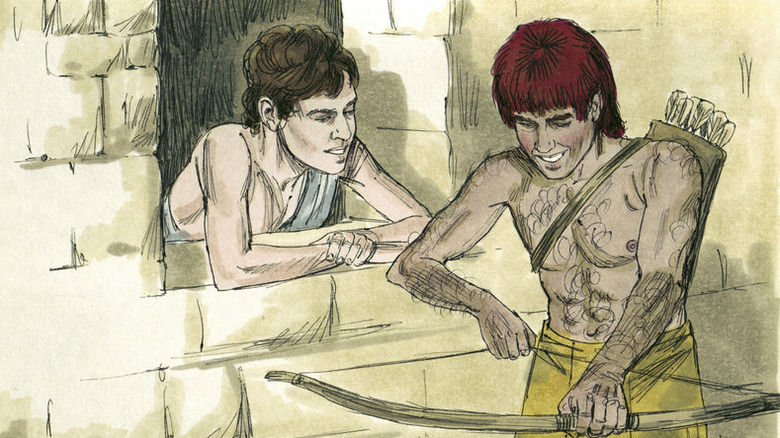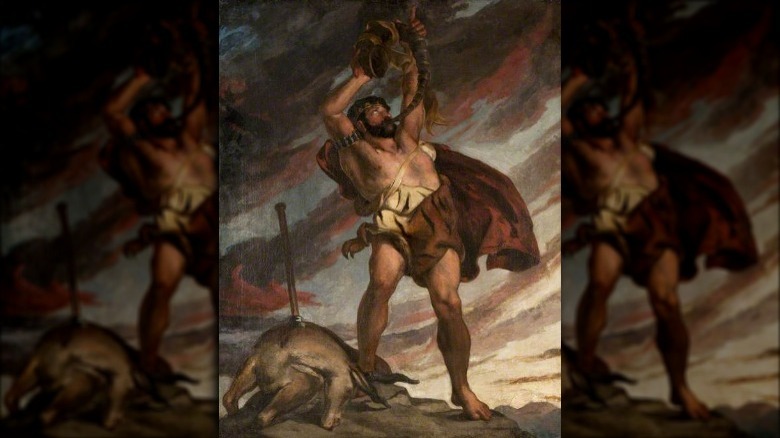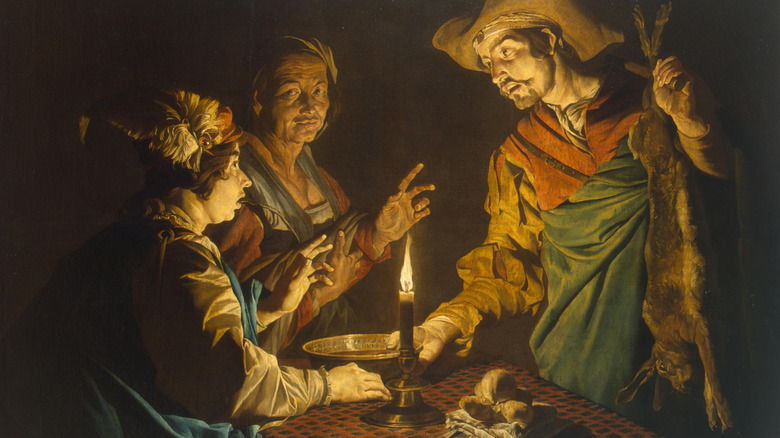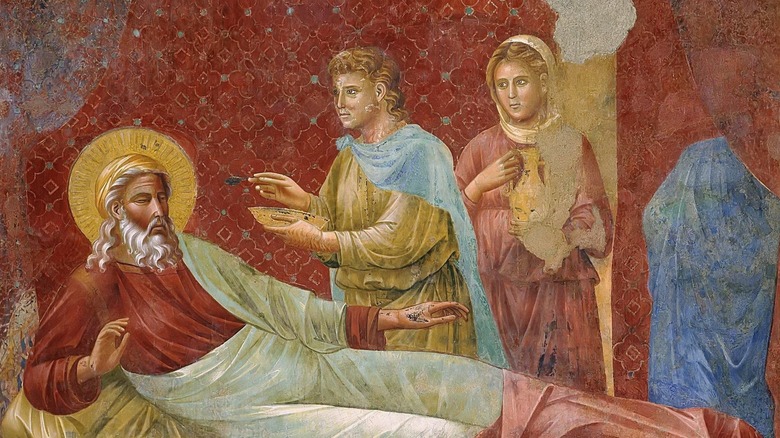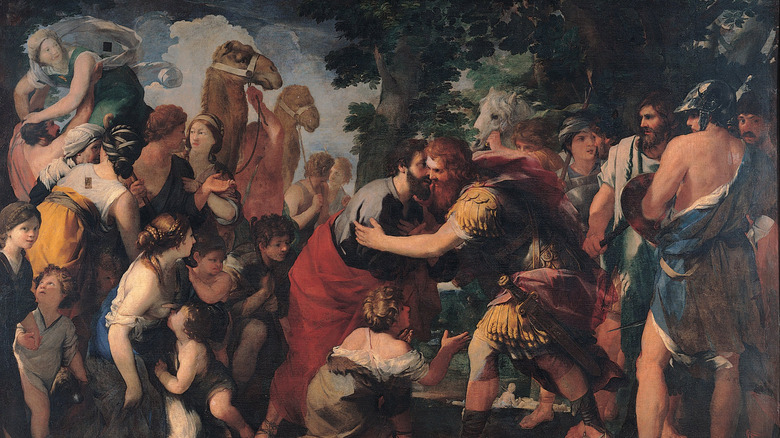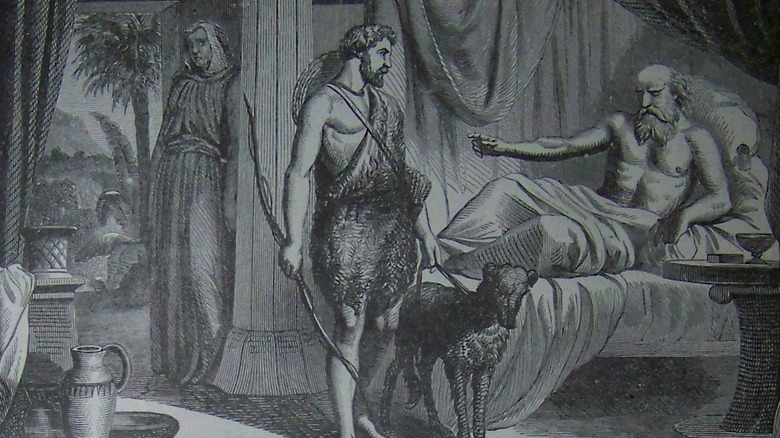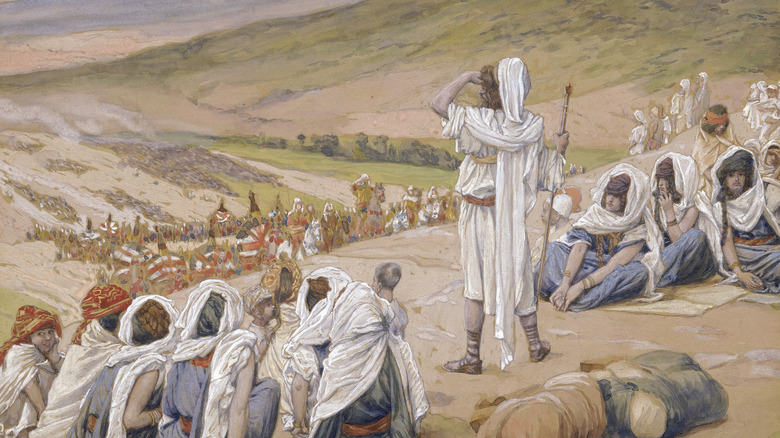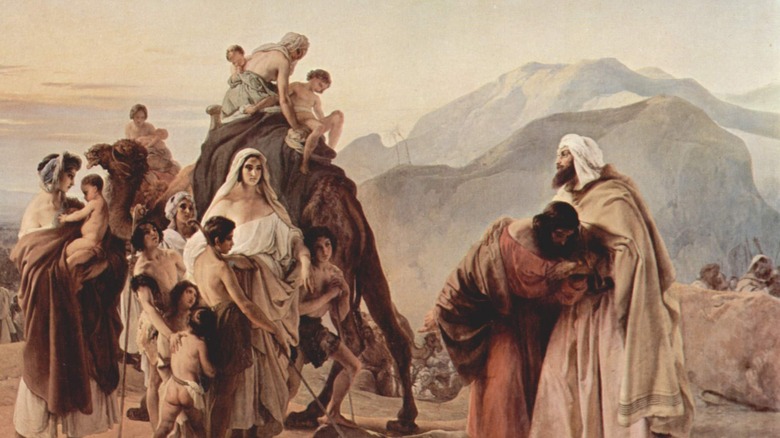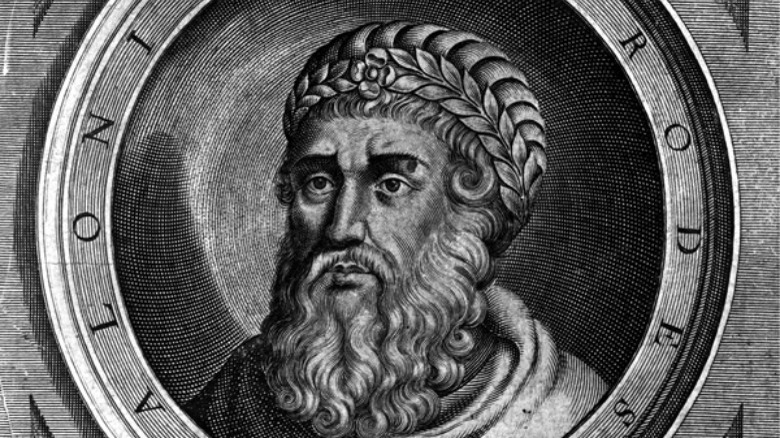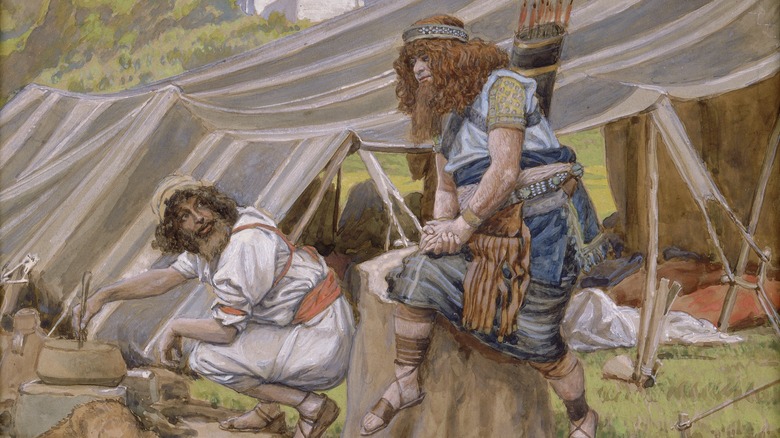The Untold Truth Of Esau From The Bible
A recurring motif in the biblical Book of Genesis is the triumph of the younger brother over the older. Abel's offering is pleasing in the sight of God while Cain's is rejected (Cain gets revenge, though, as you may have heard); Isaac is Abraham's child of promise, Ishmael is merely the child of his body; Joseph gains power over all the older brothers who sold him into slavery. But perhaps the most striking contrast between brothers comes in the form of Jacob and Esau, the twin sons of Isaac and Rebekah, grandsons of Abraham. Jacob is a major player in Jewish history: his name is later changed to Israel, which might ring a bell. Esau, by comparison, exists primarily as a foil to Jacob, who gets swindled by Jacob and disappoints his parents at every turn.
As with many relatively minor biblical characters, details about Esau have been filled in by commentators, scholars, and popular tradition. Such stories often paint Esau as an almost cartoonishly evil villain who deserves to be deceived by his brother. A more modern perspective might say that tradition has done Esau a disservice. Read on and decide for yourself.
The names of Esau
Many of the names in the Book of Genesis are plays on words that either lend symbolic meaning to a person's name–like "Adam" meaning "man" and "Eve" meaning "life"–or give something like an origin story to the way things are now, especially in the case of explaining how enmities between the nation of Israel and its enemies have been around since nearly the beginning of time, literally. The case of Esau is one such example. The problem is, however, that–as the Jewish Encyclopedia explains–we don't actually know what the name Esau means. They call the explanation given in the Bible–that Esau means "hairy," derived from a word meaning "densely wooded," because Esau was born covered in hair–"improbable."
More important was Esau's nickname Edom, which means "red." The biblical account states that this nickname comes from his being "red all over," either in terms of hair, skin, or both. The Bible makes a point to note that red was also the color of the stew Esau sold his birthright for, but more importantly, Edom was the name of a longstanding enemy of Israel, who lived to the southwest of Judah on Mount Seir. In fact, as Dr. Malka Z. Simkovich points out, the similarity of the name Seir to the Hebrew word se'ar ("covered in hair") may be a folk etymology connecting the Edomites to their legendary founder.
The remarkable birth of a hairy, toothy baby
Esau's primary role in the Book of Genesis is to serve as a foil and contrast to his brother Jacob, one of the patriarchs of the Jews, and whose later name Israel would serve as the name of the whole nation. Their rivalry begins before they are even born. Genesis 25:19-26 says that their mother Rebekah can feel the two boys struggling within her womb, which God explains to her as foreshadowing for the lasting struggles between the nations of Israel and Edom, named after the feuding twins. When the two are finally born, Esau comes out covered in hair like he's wearing a fur coat, and the ambitious baby Jacob is grasping his older brother's heel.
The traditional stories collected by Louis Ginzberg in his book "The Legends of the Jews" go into further detail to draw the twin boys into starker contrast. It says that while the boys were still in the womb, the wicked Esau would stir whenever Rebekah passed by idols of foreign gods. Furthermore, Esau is said to have been born not only with hair, but with a full beard and all his teeth. The blood-red color of his skin hinted at his future bloody nature and worried his father Isaac about his circulation, meaning Esau was never circumcised. As one final sign of his wickedness, Esau is said to have been born with a birthmark in the shape of a serpent.
Esau's blasphemous childhood
Despite the fact that tradition says that Esau was covered in red hair and bearded from birth and Jacob had white hairless skin and was miraculously circumcised from birth, nevertheless "The Legends of the Jews" says that the twin sons of Isaac and Rebekah were completely indistinguishable until the age of 13, comparing them to the myrtle and the thorn-bush, which look alike when they are young until the sweet smell of the myrtle and the thorns of the thorn-bush make it possible to tell them apart. Likewise, the personalities of Esau and Jacob made it clear who was who.
While Jacob continued his schooling after the age of 13 and became a pious learner, Esau dropped out of school to pursue the life of a hunter (reflecting the canonical story in Genesis 25:27). But not only did Esau chase after animals, he also chased down a life of idolatry and immorality. While Esau originally carried out his blasphemies in secret, he eventually began to commit horrible crimes in the open, most notably committing five heinous sins in one day. These crimes were so shocking that God caused Abraham to die five years sooner than he was supposed to so that the holy man would not have to witness the depravity of his own grandson. God decided it was better for Abraham to die in peace than live as witness to Esau's rebellion against God.
Hunting the hunter
According to the Jewish Encyclopedia, rabbinic tradition states that Esau's hunting prowess brought him into conflict with another legendary hunter from the Bible: Nimrod, the Mesopotamian king called "a mighty hunter before the Lord" in Genesis 10. While Nimrod is only mentioned in passing in the canonical Bible, in legend and tradition he becomes an outsized figure who not only built the Tower of Babel but also tried to kill Esau's grandfather Abraham when he saw that he represented a threat to the worship of idols. In this story, however, Nimrod becomes jealous of the young Esau's prowess as a hunter. The feud between the two ends on a day when Nimrod becomes separated from all but two members of his hunting party, at which instant Esau, lying in ambush, jumps out and beheads the king and his two attendants. These murders represent one of the five crimes of Esau that led to the death of Abraham.
In Esau's favor, however, the death of Nimrod meant that Esau could claim as spoils the king's magical hunting cloak. This cloak had previously belonged to Adam, who had had mastery over the beasts, and according to "The Legends of the Jews," any animal who encountered a person wearing this cloak would immediately lie face down on the ground, taking basically any last vestige of sport out of hunting.
Getting swindled, Part 1
The first of two famous biblical stories about Esau is the one in which he hastily and foolishly gives away his rights as the eldest son to his younger brother Jacob in exchange for a single bowl of lentils. This story occurs in Genesis 25:27-34 and explains that Esau is so exhausted from hunting that he is desperate for food, begging for some of the "red stuff" that his brother was cooking up. The wily Jacob takes advantage of this desperation and trades some stew to his starving brother for his birthright.
In isolation, this story kind of makes it seem that our hero Jacob was less than forthright and honest in this circumstance, so fortunately tradition steps in to fill in the blanks. The Legends of the Jews explains that this was the very same day on which Abraham died and Esau committed his five great crimes. So it turns out he wasn't exhausted from hunting, he was worn out from a triple homicide. His other great crimes come in his negotiating with Jacob, who is preparing the lentils as a traditional meal of mourning following Abraham's death. Esau spurns the very idea of the resurrection of the dead, scoffs at the importance of his birthright, and doubts the very existence of God. His fifth crime that day is apparently sexual assault, but this is never explained.
Better to be blind than see Esau's sins
Despite Esau's many crimes, including directly causing the premature death of Abraham, one of the main dudes of the Bible, nevertheless Esau was the favored son of his father Isaac. Genesis 25:28 says that this is because Isaac loved the taste of wild game, which his son the mighty hunter was able to provide. According to "The Legends of the Jews," however, Esau gained his father's love largely through hypocrisy and deceit. Feigning ignorance, Esau would ask Isaac how much of a tithe offering he was supposed to give on straw and salt. This would make Isaac feel that Esau was very pious, since straw and salt were the two things exempt from tithing. Furthermore, what Isaac didn't know was that a lot of that wild game he loved so much was actually forbidden food made from unclean animals that Esau was bringing him. What Esau would tell Isaac was goat meat would actually be dog meat, for example.
The Jewish Encyclopedia adds that tradition says that Esau managed to stay within his father's good graces by never attending to him unless he was wearing Nimrod's cloak in order to impress him. Perhaps worst of all, Esau went out and married foreign wives, bringing both them and their idolatrous practices home with them. Isaac's grief at Esau's wickedness caused him to will himself to go blind so that he couldn't bear witness to his son's crimes.
The terrible wives of Esau
We learn about Esau's wives in Genesis 25:34-35, which says he married two Hittite women at the age of 40. These wives "made life bitter for Isaac and Rebekah." Unfortunately for them, Esau didn't stop there. In Genesis 26:6-9, Esau is so mad at being cheated by his brother a second time (more on that in a minute) that he disobeys his father's direct order not to marry any more Canaanite women and then marries his Canaanite cousin. Genesis 36 lays out Esau's whole family and names three Canaanite wives with different names from those listed in chapters 25 and 26, so either these are different names for the same people or Esau had six terrible wives that his parents super didn't approve of. With these wives he has five sons, who would be the forebears of the Edomite nation.
According to the Jewish Encyclopedia, traditional stories fill in more details about Esau's garbage wives, including the fact that even Esau knew they were terrible. In fact, he didn't trust them with his laundry, which helps Jacob steal his clothes and cheat him out of his blessing. Esau and his wives' idolatrous ways were shocking to Isaac, and the smoke from their sinful offerings to false gods helped contribute to Isaac's blindness. The wickedness of Esau and his wives convinced Rebekah to help Jacob steal from Esau a second time.
Getting swindled, Part 2
The other most famous story of Esau from the Bible comes in Genesis chapter 27, when Esau's mother Rebekah helps his younger brother Jacob steal the blessing that is Esau's right as the oldest son by tricking their old blind father Isaac. In the biblical account, Isaac sends Esau out to hunt them something to eat before he bestows his blessing upon him. While Esau is out hunting, Rebekah disguises Jacob as Esau by dressing him in Esau's clothes and covering his hairless arms with goat skins so that he will feel and smell like Esau to his blind father. By the time Esau returns, Isaac has already blessed Jacob and it turns out there are no takebacks on paternal blessings.
While the biblical accounts make it seem like Jacob is stealing from his brother just because he can, we've already seen how the rabbinical tradition has justified Jacob's actions by vilifying Esau. "The Legends of the Jews" explains that God aided in the deception of Esau and Isaac by sending Satan down to keep him from successfully catching something for Isaac to eat. Every time Esau, apparently leaving his magic cloak at home, caught a deer, Satan would free it, giving Rebekah and Jacob time to carry out their plan. The idea of Esau being blessed was apparently so heinous that God and Satan teamed up to stop it.
A murderous grudge
After having both his birthright and his blessing stolen by his supposedly holy little brother, it only stands to reason that Esau would be a little upset. Genesis 27:41 tells us that Esau fully intends to murder Jacob. Fortunately, Rebekah catches wind of this and sends Jacob to go spend a few decades with out-of-town family. Jacob's sudden and desperate flight for his life means that the inheritance that he swindled out of Esau's hands in exchange for a bowl of stew is left under Esau's stewardship after all.
The biblical record doesn't show us any of Esau's attempts to murder Jacob, but fortunately the rabbis have considered everything. The Jewish Encyclopedia tells us that Esau sent his son Eliphaz to ambush Jacob on the road to their uncle's house. The teenage Eliphaz, accompanied by 10 of his mother's Canaanite brothers, is nevertheless persuaded away from his murder attempt when Jacob gives them all the gold and silver that he has. Esau is angry with Eliphaz for shirking his murder duty but happily takes all the gold and silver for himself anyway. When Jacob returns home after 20 years of working for their uncle, Esau himself tries to attack and kill Jacob, despite their mother's pleas. It is only when God sends a host of angels to intimidate Esau that the ruddy hunter agrees to reconcile with his twin.
Esau tries to Dracula Jacob
The biblical account in Genesis 32 says that after 20 years of enriching himself in money, flocks, wives, and a grip of kids, Jacob is forced to flee back to his home when his uncle becomes jealous of his success. Jacob is, naturally, afraid of coming back into contact with Esau, the brother he has cheated in two big ways. Chapter 33 tells us, however, that Jacob didn't need to be afraid: Esau has grown wealthy and happy in Jacob's absence and has long since forgiven him. The brothers hug and kiss each other, and this joyful reunion is the last we see of Esau. We're never even given an account of his death.
Jewish legend, however, says that this reunion wasn't as happy as Genesis makes it sound. As "The Legends of the Jews" explains, Esau is prepared to lay an assault on his returning brother with 400 men leading armies of 400 men each until God's angels intervene. Despite being afraid that this legion of heavenly warriors is under Jacob's command, Esau determines to kill Jacob not with any weapon, but by biting his neck when they hug and sucking all his blood out like Dracula. Fortunately, at the last second Jacob's neck is turned to ivory, and the broken-toothed Esau is forced to satisfy himself with gifts of great wealth from Jacob instead of a feast of his brother's blood.
Esau as the founder of ... Rome?
As Dr. Malka Z. Simkovich explains, after Esau and Jacob reconcile in Genesis 33, the two brothers go their separate ways, with Jacob settling in Canaan and Esau taking his family to the hill country of Seir, which area came to be known by Esau's nickname, Edom. The historical Edomites, who lived to the southwest of what would become the Kingdom of Judah, would fulfill the prophecy that Esau's line would serve Jacob's when King David led a conquest against Edom, at least according to the biblical books of Samuel and Kings. The Edomites sided with the Babylonians in their conquest of Judah in 586 BCE, allowing them to expand their kingdom in much of the old Judahite territory, but the Jews conquered the people of Edom once again and forcibly converted them to Judaism during the reign of the Hasmonean kings.
In later centuries, however, it was not a small kingdom in the hill country that Jewish people associated with Edom. Instead, it was the greatest city in the world at the time: Rome. The association between Rome and Edom likely begins because Edom–known by the Romans as Idumea–was the origin of Herod the Great, the Jewish client king who ruled Judea on behalf of the Romans. Following Herod's death, Judea was fully absorbed by Rome, thus indelibly linking the mighty empire and the king from Idumea.
Have we wronged Esau as much as Jacob did?
An important thing to remember about Esau is that all of the information about him being a murderer, idolator, and attempted vampire all come from extra-biblical sources. The worst crimes that Esau commits within the actual pages of the Book of Genesis are temporarily being upset that his brother stole his livelihood from him and having annoying wives. In the end, Esau turns out to be a big enough man to forgive his brother's crimes against him. Such a view is espoused by Rabbi Danya Ruttenberg, who says that centuries of tradition have failed to give Esau the benefit of the doubt when reading between the lines of scripture. While it's easy to see Esau as a dumb jock who values a full belly over a long-term investment, it's just a possible to view Jacob as a shrewd and unscrupulous manipulator who took advantage of his brother's dire straits to get what he wanted.
In Rabbi Ruttenberg's own words, Esau is "a sweet man who tried in good faith to do what was expected of him and who was exploited and abused by those who should have been caring for him." This is a far cry from the bloodthirsty bully of the rabbinical tradition, who needed to be truly evil to justify not only the Jewish national hero Jacob in his con artist ways, but also the Israelites' long-standing antipathy toward the people of Edom and Rome.
